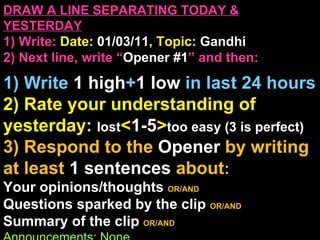010311 world gandhi 50m
- 1. DRAW A LINE SEPARATING TODAY & YESTERDAY 1) Write: Date: 01/03/11 , Topic: Gandhi 2) Next line, write â Opener #1 â and then: 1) Write 1 high + 1 low in last 24 hours 2) Rate your understanding of yesterday: lost < 1-5 > too easy (3 is perfect) 3) Respond to the Opener by writing at least 1 sentences about : Your opinions/thoughts OR/AND Questions sparked by the clip OR/AND Summary of the clip OR/AND Announcements: None
- 2. Agenda 1) India Independence Essential Question 1) How did India gain its freedom?
- 3. Quiz (10 Points) Clear desk of everything except a writing tool When done, turn quiz face down. Circle just the dots. 4) Quiz # 1
- 4. Review 1) Indians in WWI : 1 mil fight, 100,000+ die, but no freedom given
- 5. 2) Amritsar Massacre (1919) :Peaceful crowd shot by UK army b/c public meetings illegal, 400 die. Escalated the call for independence .
- 6. 3) Indian Elites : Foreign educated, lead call for independence, little in common w. poor Indians
- 7. Journ #1a , Title â Gandhi â Read and then answer these questions : 1) How did Gandhi free India? 2) How did Gandhi die ? 3) In his famous 1942 âQuit Indiaâ Speech , what were Gandhiâs feelings about England? 4) In his famous 1947 Inter-Asian speech , what was Gandhiâs message to the world? 5) Looking over the quotes, which 2 quotes have the most meaning for you? Bonus Q X) Is there a Gandhi with in everyone? If not, why not, if so, how do we find it? 5 Reading/Film Qs Come From These Work Sections
- 8. Notes #1a , Title: â Gandhi Notes â 1) Gandhi (1869-1948) : UK trained lawyer united diverse Indian groups in the fight for freedom a) Unity between Hindus and Muslims and unity between caste ( dalits )
- 9. b) Nonviolence (Ahimsa) : Donât respond w. force i) Love converts those who oppose you ii) Peace sways outsiders to your side iii) UK has more force, will win that strategy c) Civil Disobedience (Thoreau) : If a law is unjust, donât obey it, accept their punishment. i) Canât yet change the law, but can speak though disobeying ii) Shows you arenât scared of their punishments iii) Jails canât hold everyone d) Boycotts : India key customer, hurt UK by refusing to buy their products (clothing)
- 10. Journ #1b , Title â Video: India Independence â 1) Copy Source Title: Gandhi 2âĶ) Discuss questions on the board with a partner. Summarize your discussion ( include their name at the end ). Remember participation points are deducted if off task. 5 Reading/Film Qs Come From These Work Sections
- 11. Workbook Check Homework: 1) Complete Podcast











